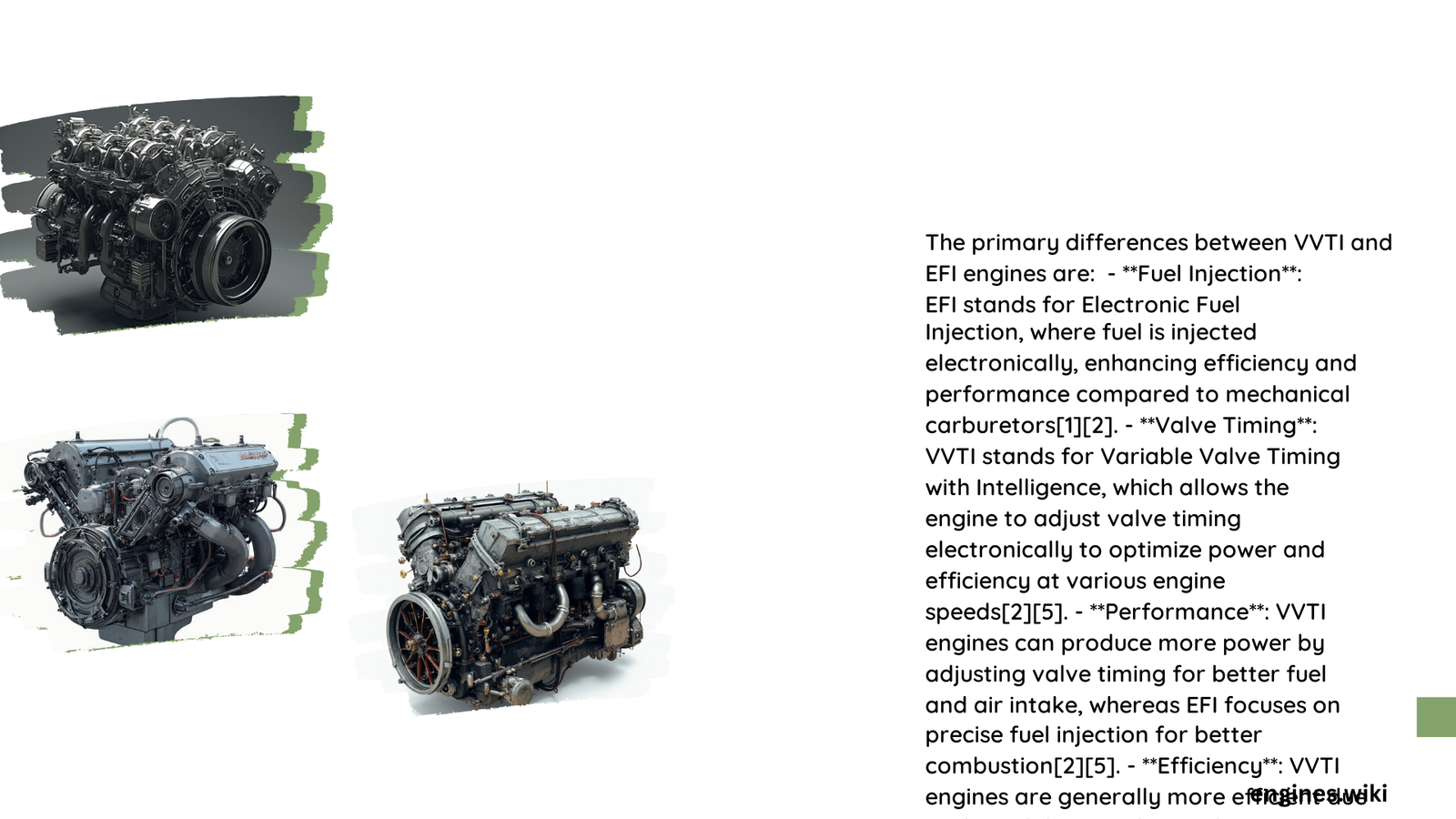The difference between VVTi and EFI engine lies in their core functionalities and impact on vehicle performance. EFI (Electronic Fuel Injection) focuses on optimizing fuel delivery, while VVTi (Variable Valve Timing-intelligent) enhances valve timing control. VVTi builds upon EFI technology, offering improved performance, fuel efficiency, and emissions control. This article delves into the key distinctions, benefits, and considerations of these engine technologies.
What Are the Fundamental Differences Between VVTi and EFI Engines?
VVTi and EFI engines differ primarily in their core functionalities and the aspects of engine operation they control:
- EFI (Electronic Fuel Injection):
- Replaces traditional carburetors
- Controls fuel injection electronically
-
Ensures precise fuel delivery based on engine parameters
-
VVTi (Variable Valve Timing-intelligent):
- Builds upon EFI technology
- Adjusts valve timing in real-time
- Optimizes engine performance across various conditions
EFI focuses on fuel management, while VVTi enhances overall engine efficiency by controlling valve operations. VVTi is not a replacement for EFI but rather an additional technology that works in conjunction with it.
How Do VVTi and EFI Engines Compare in Performance?

The performance differences between VVTi and EFI engines are significant:
- Power Output:
- VVTi: Generally produces higher horsepower and torque
-
EFI: Offers improved power over carbureted engines but less than VVTi
-
Fuel Efficiency:
- VVTi: Superior fuel economy due to optimized valve timing
-
EFI: Better efficiency than carburetors, but not as refined as VVTi
-
Emissions:
- VVTi: Lower emissions due to optimized combustion
-
EFI: Reduced emissions compared to carburetors, but higher than VVTi
-
Throttle Response:
- VVTi: More responsive and smoother power delivery
- EFI: Improved over carburetors, but less refined than VVTi
What Are the Technical Aspects That Set VVTi Apart from EFI?
The technical distinctions between VVTi and EFI are crucial for understanding their performance differences:
- Valve Control:
- VVTi: Adjusts intake and exhaust valve timing
-
EFI: No control over valve timing
-
Operational Range:
- VVTi: Optimizes performance across a wide RPM range
-
EFI: Fixed valve timing limits optimization across RPM ranges
-
Adaptability:
- VVTi: Adapts to various driving conditions in real-time
-
EFI: Adapts fuel injection but not valve timing
-
Complexity:
- VVTi: More complex system with additional components
- EFI: Simpler system focused on fuel injection control
What Are the Maintenance Implications of VVTi vs EFI Engines?
Maintenance considerations differ between VVTi and EFI engines:
- Complexity:
- VVTi: More complex, requiring specialized knowledge for maintenance
-
EFI: Simpler system, easier to maintain
-
Oil Sensitivity:
- VVTi: Highly sensitive to oil quality and condition
-
EFI: Less sensitive to oil conditions
-
Service Intervals:
- VVTi: May require more frequent oil changes and inspections
-
EFI: Standard maintenance schedules typically suffice
-
Cost:
- VVTi: Higher maintenance and repair costs due to complexity
- EFI: Generally lower maintenance costs
How Do VVTi and EFI Engines Impact Vehicle Cost?
The cost implications of VVTi and EFI engines extend beyond initial purchase:
- Initial Cost:
- VVTi: Higher due to advanced technology
-
EFI: Lower initial cost compared to VVTi
-
Fuel Costs:
- VVTi: Lower long-term fuel costs due to better efficiency
-
EFI: Higher fuel costs compared to VVTi
-
Maintenance Expenses:
- VVTi: Higher due to complexity and specialized parts
-
EFI: Lower maintenance costs over time
-
Resale Value:
- VVTi: Potentially higher resale value due to advanced technology
- EFI: May have lower resale value compared to VVTi-equipped vehicles
What Are the Environmental Impacts of VVTi vs EFI Engines?
Environmental considerations are increasingly important in engine technology:
- Emissions:
- VVTi: Lower overall emissions due to optimized combustion
-
EFI: Higher emissions compared to VVTi, but lower than carbureted engines
-
Fuel Efficiency:
- VVTi: Better fuel economy, reducing overall carbon footprint
-
EFI: Less fuel-efficient than VVTi, leading to higher carbon emissions
-
Resource Usage:
- VVTi: May require more resources in production due to complexity
-
EFI: Simpler design may use fewer resources in manufacturing
-
Longevity:
- VVTi: Potential for longer engine life due to optimized operation
- EFI: May have shorter lifespan compared to well-maintained VVTi engines
Conclusion: Which Engine Technology Is Superior?
While both VVTi and EFI offer advantages over older carburetor systems, VVTi generally provides superior performance, efficiency, and environmental benefits. However, the choice between VVTi and EFI depends on various factors:
- Performance requirements
- Budget constraints
- Maintenance preferences
- Environmental considerations
VVTi offers cutting-edge technology with better overall performance, but comes with higher costs and maintenance requirements. EFI provides a reliable, cost-effective solution that still offers significant improvements over carbureted engines.
Ultimately, the decision between VVTi and EFI should be based on individual needs, preferences, and long-term ownership considerations.
References:
1. The complexity of VVT-i engines and best productivity – Daily Nation
2. What is the difference between a vvti engine and efi engine? – Answers.com
3. VVTI vs Vtec Engine – PakWheels Forums
